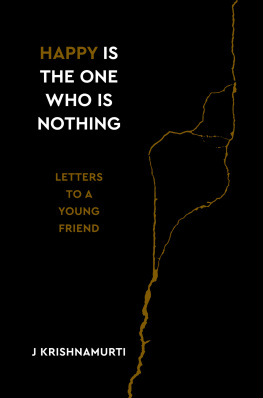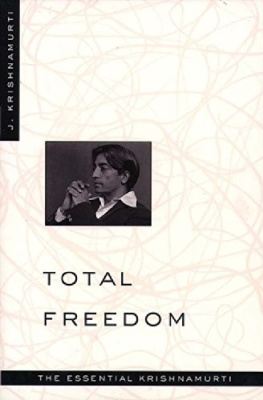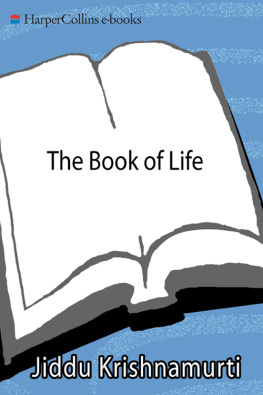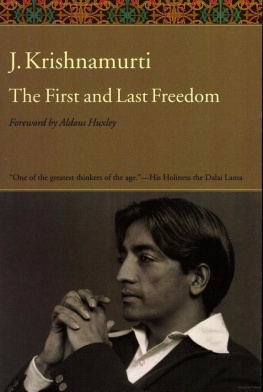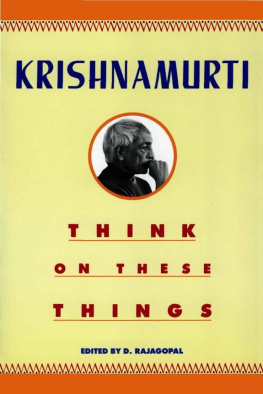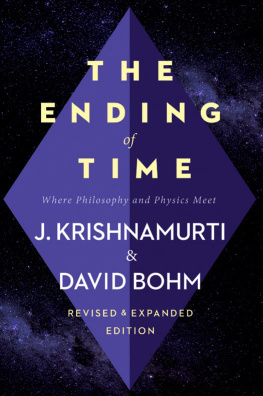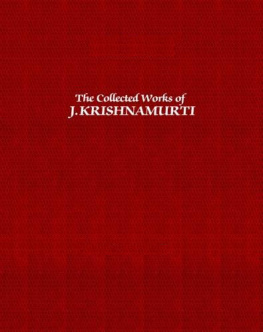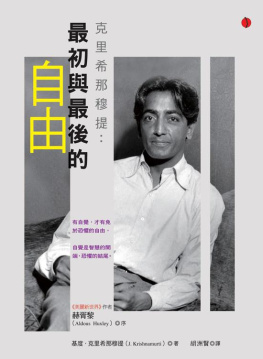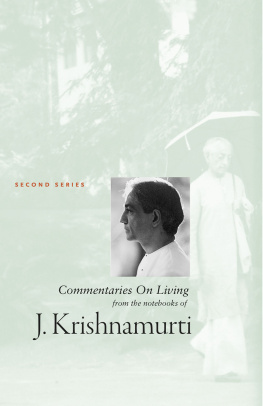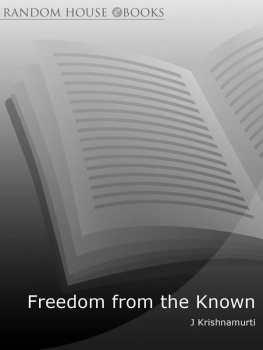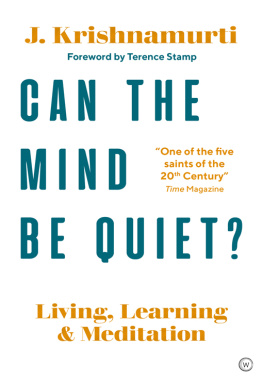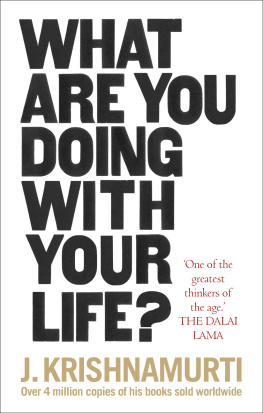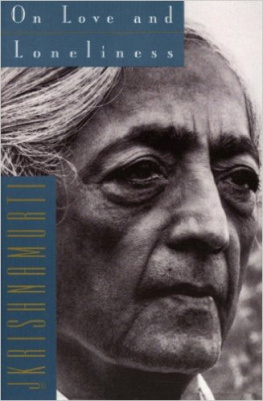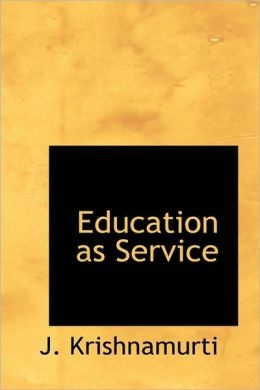Jiddu Krishnamurti - Happy Is the One Who Is Nothing
Here you can read online Jiddu Krishnamurti - Happy Is the One Who Is Nothing full text of the book (entire story) in english for free. Download pdf and epub, get meaning, cover and reviews about this ebook. publisher: Watkins Media, genre: Religion. Description of the work, (preface) as well as reviews are available. Best literature library LitArk.com created for fans of good reading and offers a wide selection of genres:
Romance novel
Science fiction
Adventure
Detective
Science
History
Home and family
Prose
Art
Politics
Computer
Non-fiction
Religion
Business
Children
Humor
Choose a favorite category and find really read worthwhile books. Enjoy immersion in the world of imagination, feel the emotions of the characters or learn something new for yourself, make an fascinating discovery.
- Book:Happy Is the One Who Is Nothing
- Author:
- Publisher:Watkins Media
- Genre:
- Rating:5 / 5
- Favourites:Add to favourites
- Your mark:
- 100
- 1
- 2
- 3
- 4
- 5
Happy Is the One Who Is Nothing: summary, description and annotation
We offer to read an annotation, description, summary or preface (depends on what the author of the book "Happy Is the One Who Is Nothing" wrote himself). If you haven't found the necessary information about the book — write in the comments, we will try to find it.
Happy Is the One Who Is Nothing — read online for free the complete book (whole text) full work
Below is the text of the book, divided by pages. System saving the place of the last page read, allows you to conveniently read the book "Happy Is the One Who Is Nothing" online for free, without having to search again every time where you left off. Put a bookmark, and you can go to the page where you finished reading at any time.
Font size:
Interval:
Bookmark:


This edition first published in the UK and USA 2020 by
Watkins, an imprint of Watkins Media Limited
Unit 11, Shepperton House
89-93 Shepperton Road
London
N1 3DF
Design and typography copyright Watkins Media Limited 2020
Text Copyright Krishnamurti Foundation Trust 2020
Edited by Duncan Toms
Krishnamurti, Jiddu (18951986) has asserted his right under the Copyright, Designs and Patents Act 1988 to be identified as the author of this work.
The contents of part one of this book first appeared in Krishnamurti: A Biography by Pupul Jayakar, published by Penguin Books, India.
Krishnamurti Foundation of America All rights reserved. No part of this book may be reproduced or utilized in any form or by any means, electronic or mechanical, without prior permission in writing from the Publishers.
1 3 5 7 9 10 8 6 4 2
Designed and Typeset by Watkins
Printed and bound in the UK by TJ International Ltd.
A CIP record for this book is available from the British Library
ISBN: 978-1-786782-75-5
www.watkinspublishing.com
CONTENTS
PART ONE
LETTERS TO A YOUNG FRIEND
Between 1948 and the early 1960s, Krishnamurti was easily accessible, and many people came to him. On walks, in personal meetings, through letters, relationships blossomed.
He wrote the following letters to a young friend who came to him wounded in body and mind. Written between June 1948 and March 1960, the letters reveal a rare compassion and clarity: the teaching and healing unfold; separation and distance disappear; the words flow; not a word is superfluous; the healing and the teaching are simultaneous.
Pupul Jayakar
Be supple mentally. Strength does not lie in being firm and strong but in being pliable. The pliable tree stands in a gale. Gather the strength of a swift mind.
Life is strange, so many things happen unexpectedly; mere resistance will not solve any problem. One needs infinite pliability and a single heart.
Life is a razors edge, and one has to walk on that path with exquisite care and with pliable wisdom.
Life is so rich, has so many treasures. We go to it with empty hearts; we do not know how to fill our hearts with the abundance of life. We are poor inwardly, and when riches are offered to us, we refuse. Love is a dangerous thing; it brings the only revolution that gives complete happiness. So few of us are capable of love, so few want love. We love on our own terms, making of love a marketable thing. We have a market mentality, and love is not marketable, a give-and-take affair. It is a state of being in which all our problems are resolved. We go to the well with a thimble, and so life becomes a tawdry affair, puny and small.
What a lovely place the earth could be, for there is so much beauty, so much glory, such imperishable loveliness. We are caught in pain and dont care to get out of it, even when someone points a way out.
One is aflame with love. There is an unquenchable flame. One has so much of it that one wants to give it to everyone, and one does. It is like a strong flowing riverit nourishes and waters every town and village; it is polluted, the filth of man goes into it, but the waters soon purify themselves and swiftly move on. Nothing can spoil love, for all things are dissolved in itthe good and the bad, the ugly and the beautiful. It is the only thing that is its own eternity.
The trees were so stately and strangely impervious to mans tarred roads and traffic. Their roots were deep down, deep in the earth, and their tops stretched to the skies. We have our roots in the earth, which we must have, but we cling or crawl on the earth; only a few soar into the skies. They are the only creative and happy people. The rest spoil and destroy each other on this lovely earth, by hurt and likewise gossip.
Be open. Live in the past if you must, but dont struggle against it; when the past comes, look into it, not pushing it away nor holding to it too much. The experience of all these years, the ache and the joy, the sickening blows and your glimpses of the separation, the faraway sense, all these will add enrichment and beauty. What is important is what you have in your heart; and since that is overflowing, you have everything, you are everything.
Be alert to all your thoughts and feelings; dont let one feeling or thought slip by without being aware of it and absorbing all its content. Absorbing is not the word, but seeing the whole content of the thought-feeling. It is like entering a room and seeing the whole content of the room at once, its atmosphere and its spaces. To see and be aware of ones thoughts makes one intensively sensitive, pliable and alert. Dont condemn or judge, but be very alert. Out of separation, out of the dross comes pure gold.
To see what is is really quite arduous. How does one observe clearly? A river when it meets an obstruction is never still; the river breaks down an obstruction by its weight or goes over it or works its way under it or around it; the river is never still, it cannot but act. It revolts intelligently, if we can so put it. One must revolt intelligently and accept what is intelligently. To perceive what is, there must be the spirit of intelligent revolt. Not to mistake the obstacle needs a certain intelligence, but generally one is so eager to get what one wants that one dashes against it. Either one breaks oneself on the obstacle or one exhausts oneself in the struggle against it. To see the rope as the rope needs no courage, but to mistake the rope for a snake and then to observe needs courage. One must doubt, ever search, see the false as the false. One gets power to see clearly through the intensity of attention; you will see it will come.
One has to act. The river is never not-acting; it is ever active. One must be in a state of negation to act, and this very negation brings its own positive action. The problem is to see clearly; then that very perception brings its own action. When there is elasticity, there is no question of right and wrong.
One must be very clear within oneself. Then I assure you everything will come right; be clear and you will see that things will shape themselves right without your doing anything about it. The right is not what one desires.
There must be a complete revolution, not only in great things but in little everyday things. You have had that revolution; dont settle back, keep at it. Keep the pot boiling, inwardly.
I hope you have had a good night, a pleasant sunrise out of your window, and you were able to see the evening stars peacefully before you went to sleep.
How little we know of love, of its extraordinary tenderness and power. How easily we use the word love. The general uses it, the butcher uses it, the rich man uses it, and the young boy and girl use it. But how little they know of it, its vastness, its deathlessness, its unfathomability. To love is to be aware of eternity.
What a thing relationship is, and how easily we fall into the habit of a particular relationship; things are taken for granted, the situation accepted, and no variation tolerated; no movement towards uncertainty, even for a second, entertained. Everything is so well regulated, so made secure, so tied down, that there is no chance for any freshness, for a clear reviving breath of the spring. This and more is called relationship. If we closely observe, relationship is much more subtle, more swift than lightning, more vast than the earth, for relationship is life. Life is conflict, and we want to make relationship crude, hard and manageable. So it loses its fragrance, its beauty. All this arises because one does not love, and that, of course, is the greatest thing of all, for in it there has to be the complete abandonment of oneself.
Next pageFont size:
Interval:
Bookmark:
Similar books «Happy Is the One Who Is Nothing»
Look at similar books to Happy Is the One Who Is Nothing. We have selected literature similar in name and meaning in the hope of providing readers with more options to find new, interesting, not yet read works.
Discussion, reviews of the book Happy Is the One Who Is Nothing and just readers' own opinions. Leave your comments, write what you think about the work, its meaning or the main characters. Specify what exactly you liked and what you didn't like, and why you think so.

